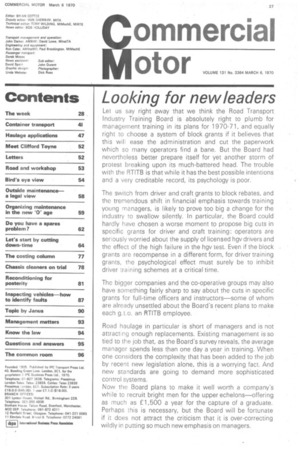Looking for newleaders
Page 29

If you've noticed an error in this article please click here to report it so we can fix it.
Let us say right away that we think the Road Transport Industry Training Board is absolutely right to plumb for management training in its plans for 1970-71, and equally right to choose a system of block _grants if it believes that this will ease the administration and cut the paperwork which so many operators find a bane. But the Board had nevertheless better prepare itself for yet another storm of protest breaking upon its much-battered head. The trouble with the RTITB is that while it has the best possible intentions and a very creditable record, its psychology is poor.
The switch from driver and craft grants to block rebates, and the tremendous shift in financial emphasis towards training young managers, is likely to prove too big a change for the industry to swallow silently. In particular, the Board could hardly have chosen a worse moment to propose big cuts in specific grants for driver and craft training: operators are seriously worried about the supply of licensed hgv drivers and the effect of the high failure in the hgv test. Even if the block grants are recompense in a different form, for driver training grants, the psychological effect must surely be to inhibit driver training schemes at a critical time.
The bigger companies and the co-operative groups may also have something fairly sharp to say about the cuts in specific grants for full-time officers and instructors—some of whom are already unsettled about the Board's recent plans to make each g.t.o. an RTITB employee.
Road haulage in particular is short of managers and is not attracting enough replacements. Existing management is so tied to the job that, as the Board's survey reveals, the average manager spends less than one day a year in training. When one considers the complexity, that has been added to the job by recent new legislation alone, this is a worrying fact. And new standards are going to demand more sophisticated control systems.
Now the Board plans to make it well worth a company's while to recruit bright men for the upper echelons—offering as much as £1,500 a year for the capture of a graduate. Perhaps this is necessary, but the Board will be fortunate if it does not attract the criticism that it is over-correcting wildly in putting so much new emphasis on managers.




























































































































































